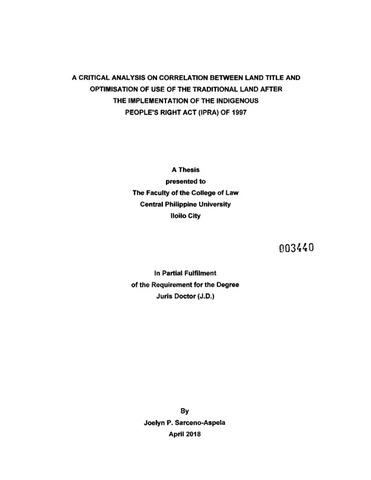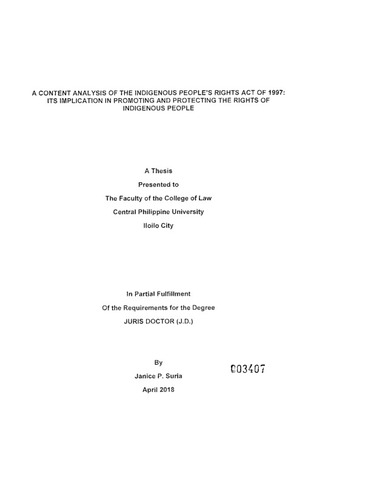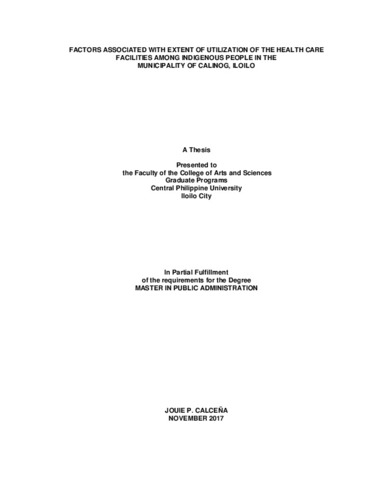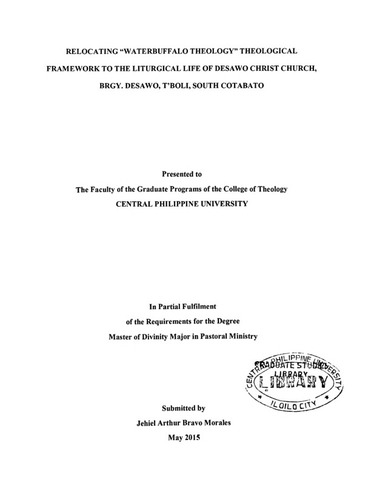A critical analysis on correlation between land title and optimisation of use of the traditional land after the implementation of the Indigenous People’s Right Act (IPRA) of 1997
| dc.contributor.adviser | Alibogha, Salex E. | |
| dc.contributor.author | Sarceno-Aspela, Joelyn P. | |
| dc.date.accessioned | 2021-06-29T08:00:11Z | |
| dc.date.available | 2021-06-29T08:00:11Z | |
| dc.date.issued | 2018 | |
| dc.identifier.citation | Sarceno-Aspela, J. P. (2018). A critical analysis on correlation between land title and optimisation of use of the traditional land after the implementation of the Indigenous People’s Right Act (IPRA) of 1997 (Unpublished postgraduate thesis). Central Philippine University, Jaro, Iloilo City. | en_US |
| dc.identifier.uri | https://hdl.handle.net/20.500.12852/1122 | |
| dc.description | Abstract only | en_US |
| dc.description.abstract | The fundamental development of indigenous people lies in the recognition of their rights to their traditional territories. This study was conducted to examine the experiences of indigenous communities after the recognition of their land rights by the State. It explores whether this recognition has enabled indigenous communities has enabled to achieved optimum use of their lands, whether the land is used for traditional and other purposes. Free prior and informed consent (FPIC) represents a critical tool in the realization of indigenous people land rights. Thus, a framework embodying the FPIC including the National Commission on Indigenous People (NCIP), the government agency responsible for developing and implementing policies and programs to protect and promote indigenous peoples’ right that influence the use of indigenous people territories was used for data collection and analysis. The results reveal a contradiction in the outcome of the supposed ideals and intents of the formal title for the indigenous people. While it guaranteed them to live within their territories, the title has not allowed the realisation of other rights emanating from their title including the rights to fully access their lands and resources. Essentially, the positive gains of the title are lessened by the inadequate implementation of their land rights by the government, resulting to a continued denial of the exercise of the rights of the indigenous people. | en_US |
| dc.format.extent | vi, 64 leaves | en_US |
| dc.language.iso | en | en_US |
| dc.rights | Attribution-NonCommercial-NoDerivs 3.0 Philippines | * |
| dc.rights.uri | http://creativecommons.org/licenses/by-nc-nd/3.0/ph/ | * |
| dc.subject.ddc | Law Library 340.72 Sa71 2018 | en_US |
| dc.subject.lcsh | Indigenous peoples | en_US |
| dc.subject.lcsh | Indigenous peoples--Legal status, laws, etc. | en_US |
| dc.subject.lcsh | Indigenous peoples--Civil rights | en_US |
| dc.subject.lcsh | Indigenous peoples--Land tenure | en_US |
| dc.subject.lcsh | Land use | en_US |
| dc.subject.lcsh | Land titles | en_US |
| dc.subject.lcsh | Land tenure | en_US |
| dc.subject.lcsh | Free, prior, and informed consent (Indigenous rights) | en_US |
| dc.title | A critical analysis on correlation between land title and optimisation of use of the traditional land after the implementation of the Indigenous People’s Right Act (IPRA) of 1997 | en_US |
| dc.type | Thesis | en_US |
| dc.description.bibliographicalreferences | Includes bibliographical references | en_US |
| dc.contributor.chair | Bedona, Zacarias D. Jr. | |
| dc.contributor.department | College of Law | en_US |
| dc.description.degree | Juris Doctor | en_US |
| local.subject | Indigenous People’s Right Act of 1997 (IPRA) | en_US |
| local.subject | RA 8371 | en_US |
| local.subject | National Commission on Indigenous Peoples (NCIP) | en_US |
이 항목의 파일
This item appears in the following Collection(s)
-
Juris Doctor [144]






